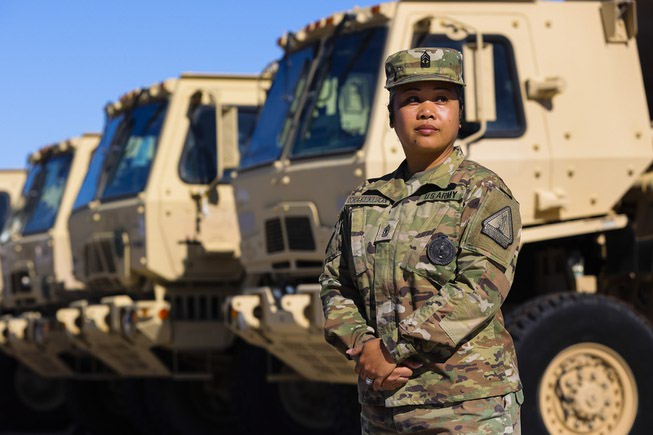
First Sergeant Michelle Ochoa-Kulukulualani poses for a photo at the Army Readiness Center Tuesday, Nov. 15, 2022.
Monday, Nov. 21, 2022 | 2 a.m.
While U.S. Army recruiters are struggling to meet enlistment goals, the Nevada Army National Guard has bucked the trend.
While the active-duty Army fell 25% short of its goal for fiscal 2022, leaving some 15,000 positions empty nationwide, Nevada’s guard met 95% of its goal.
The organization “bucked national recruiting trends and has proven to remain an attractive option for employment in the Silver State,” according to statement from the guard.
Capt. Marcus Emerson, a guard spokesman, said recruiters signed up 312 new soldiers last fiscal year in Nevada, falling just short of the goal of 328.
“Even when you have the state that was second-best in the nation in hitting its recruiting goal — behind only the state of New York — we were still 16 short,” Emerson said. “This kind of shows the struggle that they’ve had nationwide.”
According to 1st Sgt. Michelle Ochoa-Kulukulualani, who oversees recruiting for the Army National Guard in Southern Nevada, the lingering effects of the COVID-19 pandemic — specifically, the slow reopening of schools — impacted recruiting.
“Because the schools were just opening up from the pandemic, a lot of (recruiters) were a little bit nervous to talk to people face to face,” Ochoa-Kulukulualani said. “And the kids who have graduated from high school (and been) online, (speaking with recruiters is) a huge, great struggle as well.”
The propensity for young people to join the military in the fall of 2021 was the lowest it has been since 2007, according to a U.S. Department of Defense poll.
Of those surveyed between the ages of 16 and 21, some 9% said they would definitely or probably serve in the military.
That compares with numbers in years back to 2001 that fairly consistently hovered in the range of 12% to 16%.
Among the top reasons people cited for considering joining the military were money, paying for future education, travel, medical benefits and gaining experience and work skills, according to the poll.
The main reasons cited for not considering joining the military were the possibility of being hurt or killed, the chance of suffering psychological issues, leaving family and friends, other career interests and dislike of military lifestyle.
A decline in public trust in the military could also be contributing to the recruiting troubles, according to the Ronald Reagan Presidential Foundation and Institute’s annual Reagan National Defense Survey.
For the first time, the 2021 survey found a minority of Americans — 45% — had a great deal of trust and confidence in the military, down 25 points in the past three years.
“Perhaps most troubling for recruitment in the all-volunteer force is that only a third of adults younger than 30 have high confidence in the military, which is down 20 points since 2018,” the report said.
Ochoa-Kulukulualani said the young people recruiters consistently see are those who have “had family members or friends join the military, they just want to make money, they want to do it for honor.”
“So, those are the kinds of kids we usually attract year-to-year,” she said.
Many young people are also drawn by the prospect of military benefits and a sense of family, Ochoa-Kulukulualani said.
Emerson said benefits for qualifying veterans include a 100% tuition waiver at Nevada public universities and colleges, which may be transferred to a spouse or child.
Ochoa-Kulukulualani said she is hoping for another strong recruiting year ahead.
“The first half of the year, we weren’t doing good at all (because) it was the beginning of when everything else was opening up,” she said. “Imagine if it was open all the way since the beginning. … My recruiters would be tackling the streets.”
